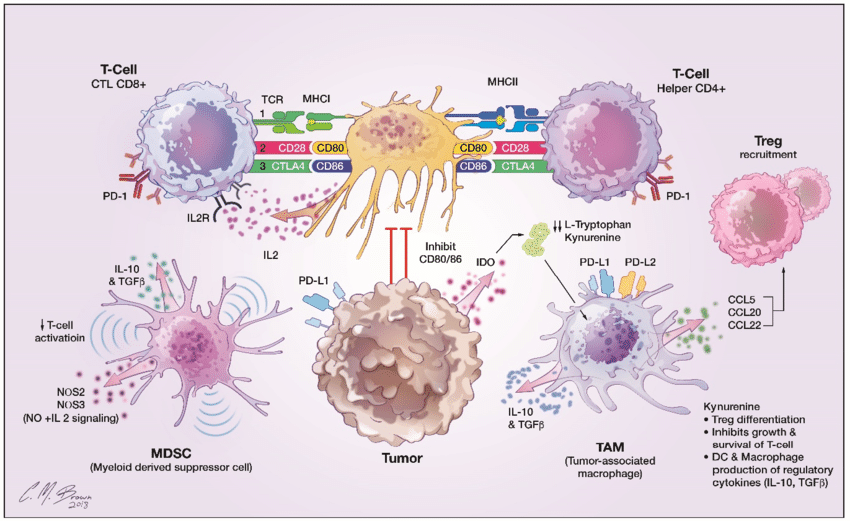Uncovering the Latest Breakthroughs in Cancer Immunotherapy
- Haneen Awada
- Apr 20, 2024
- 3 min read
In recent years, cancer immunotherapy has emerged as a revolutionary method in the battle against cancer. Unlike traditional cancer therapies that focus on attacking tumor cells,

immunotherapy harnesses the power of the body's immune system to recognize and eliminate cancer cells. This innovative approach has led to significant progress in the treatment of cancer, offering new hope to patients with different types of cancer.
The discovery of checkpoint inhibitors and how widely they are used mark a big jump forward in cancer care. These drugs work by aiming at specific proteins on cancer or immune cells that help control how the immune system reacts. Checkpoint inhibitors help by blocking

these proteins, which lets the immune system better spot and fight cancer cells. Key examples include drugs that go after the CTLA-4 protein, like ipilimumab, and PD-1 proteins, like pembrolizumab and nivolumab. The breakthrough of these drugs has changed how we treat many cancers, such as those of the bladder, lung, and skin, in a big way. This has led to longer lives for patients in many cases.

As experts dig deeper into how cancer immunotherapy works, mixing different methods is starting to look like a better way to beat cancer. The idea is to join forces between checkpoint inhibitors and other immunotherapies, like cancer vaccines or adoptive cell therapy, to boost the battle against cancer. Also, when you add checkpoint inhibitors to usual treatments like radiation therapy or chemotherapy, they can help even more. This lets us fight cancer from all sides. Right now, there are tests going on to see how well these mixed treatments work, offering hope for better results for people facing cancer.
Even with big wins in cancer immunotherapy boosts from the body's own guard system, there are still big hurdles. Experts are hard at work trying to fix problems like bad autoimmune reactions, treatments stopping working, and how much they cost. They're also trying to figure out which treatment combinations work best together for each person and how to identify biomarkers that can predict who will respond well to treatment. Looking

ahead, new immunotherapeutic agents and precision medicine show hope for making these cancer fights better and more people can get them. By tackling these issues and keeping up with new ideas, the fight against cancer through boosting our body's defenses is set to make even bigger leaps.
Cancer care has changed a lot because of immunotherapy, giving new hope and better outcomes to patients. This treatment uses the body's defense system to attack and kill cancer cells. It has led to very good and long-lasting results, including long breaks from the disease in some cases. With

more customized treatment plans for each patient, the range of immune-based treatments—like drugs that boost the immune response, CAR-T cell therapy, and cancer vaccines—is growing. The future of cancer immunotherapy looks bright as studies keep giving us more info on how tumors and the immune system interact, and the complex nature of the tumor surroundings.
References:
“Current Progress and Future Perspectives of Immune Checkpoint in Cancer and Infectious Diseases.” Frontiers, https://www.frontiersin.org/journals/genetics/articles/10.3389/fgene.2021.785153/full. Accessed 13 April 2024.
Urba, Walter J. “Improved survival with ipilimumab in patients with metastatic melanoma.” PubMed, 19 August 2010, https://pubmed.ncbi.nlm.nih.gov/20525992/. Accessed 13 April 2024.
“CAR T cell immunotherapy for human cancer.” PubMed, 23 March 2018, https://pubmed.ncbi.nlm.nih.gov/29567707/. Accessed 13 April 2024.
“Neoantigens in cancer immunotherapy.” PubMed, 3 April 2015, https://pubmed.ncbi.nlm.nih.gov/25838375/. Accessed 13 April 2024.
Dudley, Mark E. “Durable complete responses in heavily pretreated patients with metastatic melanoma using T-cell transfer immunotherapy.” PubMed, 1 July 2011, https://pubmed.ncbi.nlm.nih.gov/21498393/. Accessed 13 April 2024.
Assessed and Endorsed by the MedReport Medical Review Board


